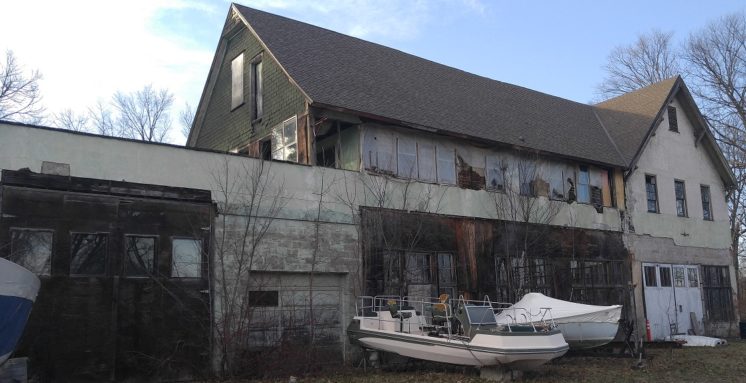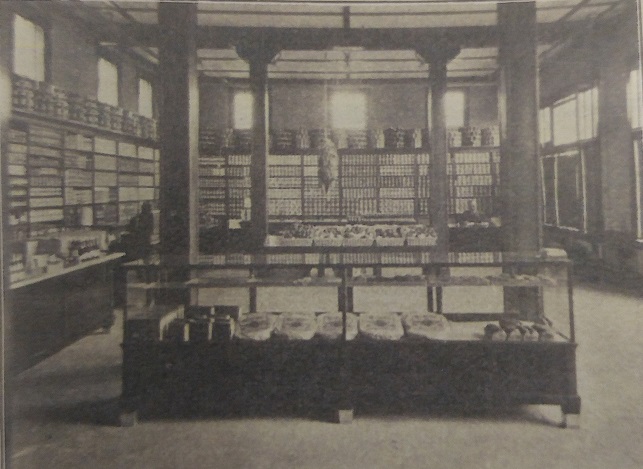The Old Riverside Store & Auditorium
 The large, weathered building on the corner of Industrial Avenue and Spring Street in Duluth’s Riverside neighborhood is a bit of a curiosity. Does someone live there? Is it basically a storage building? What was it constructed for?
The large, weathered building on the corner of Industrial Avenue and Spring Street in Duluth’s Riverside neighborhood is a bit of a curiosity. Does someone live there? Is it basically a storage building? What was it constructed for?
The “One River, Many Stories” community journalism project in April seemed like a good excuse to track down some answers. The owner of the building, Douglas J. McEneany, did not respond to requests for an interview, but searches at the Duluth Public Library for historical data were fruitful.
The structure at 1 Industrial Ave. was built in 1917. It was part of the birthing of Riverside; more than 30 structures were built that year to accommodate workers at McDougall-Duluth Ship Builders.
McDougall-Duluth’s shipbuilding operation was located along the St. Louis River at the southeast end of Spring Street. The company built ships for the American government during World War I to support the Allied forces. It was led by Alexander McDougall, a seaman, captain and inventor of the “whaleback,” a flat-bottomed lake freighter with rounded sides and deck and a snout-nosed bow.
McDougall-Duluth built freighters for the war effort until 1922, when McDougall sold the yard to Julius H. Barnes. Renamed Barnes-Duluth Shipbuilding, the company did not produce a ship until World War II began some 20 years later. Superior’s Walter Butler Shipbuilders took over operations in 1943, but closed the facility when the war ended in 1945. (A work-in-progress list of ships built by the three companies is available at shipbuildinghistory.com.) The former shipyard property has since served as a marina.
But what about that shabby gem of a building on Industrial Avenue? Originally known as the Riverside Store & Auditorium, it became more than a store for the shipyard workers.
According to a newspaper clipping from May 1, 1918, the Riverside Postal Station, founded by Charles Franson, was the first occupant. There was not home delivery service in the neighborhood, so customers had to drop in to pick up mail.
In April 1919, the Riverside State Bank joined the Riverside Postal Station in the building. The bank was 80 feet long and 35 feet wide with five windows at the counter and two fire-proof vaults in the back.
Two more stores joined the postal station and the state bank by 1920: Riverside Grocery and Riverside Pharmacy. (Polk City Directories at the Duluth Public Library served as the primary resource in this research, so it’s important to note most of the dates cited here relate to listings in the directory and might not necessarily correspond with the exact year a business opened or closed, but provide a good approximation.)
In 1921, Riverside Meat Market was established there by Steven Poupore. The pharmacy lasted only a year and the grocery store joined the Meat Market in 1922 to create Mason & Fischer Meats. James Mason and Fred Fischer operated the retail grocery store until 1934.
From 1922 to 1932, the four stores operated simultaneously. In 1934, the bank and Mason & Fischer Meats closed. Fred Fischer kept his grocery store open and Lafayette Hood took over the meat operations for a year. Edward Rygg opened a candy store there as well. The confectioner switched ownership in 1936 to Edward J. LeFreniere and again in 1937 to David H. Bohanon.
In 1938, the Standard Fuel & Stoker Co., founded by Joseph Walsh, moved in. It did not reside there for longer than a year.
Fred Fischer became the clerk in charge in 1940 at the Riverside Postal Station, while also keeping up with his career as a grocer.
The International Brotherhood of Boiler Makers, Iron Ship Builders, Welders & Helpers of American Local No. 415 moved in around 1943, under the management of John O. Pink of Superior. In 1943, Jane B. Hanna took over the candy store from Bohanon. Around 1946, John H. Dolter took over the grocery and meat store and the Duluth Public Library moved in one of its nine branches. Richard M. Boyle ran the candy store from 1946 to 1948, when James Lindquist took over.
Frank J. Reid opened the Riverside Drug Store, William A. Boyle took over the grocery store, and the Riverside Postal Station continued to flourish in 1950. Around 1952, Fred Bergman took over for Fred J. Fischer as the grocer. The Riverside Drug Store closed so Frank J. Reid ran the candy store instead. Four apartments became tenanted upstairs.
In 1954, James C. Lindquist became the grocer instead of the candy store operator. The Riverside Store and four tenants shared 1 Industrial Ave. until 1966. From 1966 to 1974, four apartments were the only occupiers listed in the building. In 1975, the Corner Cupboard Gift Shop moved in; it was closed by 1977.
In 1983, McEneany established Superior Wooden Yacht, Inc., and by 1984 was doing business as Superior Custom Yachts Boat Repair, a boat building and repair business.
Globe Snowboards, a snowboard manufacturing business, moved in by 1995. Around the same time, McEneany was operating Riverside Boatworks, a boat-building business that later moved to Harbor Cove Marina, where it remains in operation.
Globe Snowboards ceased operations by the year 2000. Highland Service Center, a general automotive repair shop, took its place.
The building was listed as vacant from 2009 to 2014. McEneany has been listed as a resident since 2015.
That’s all we know about the soon to be century-old building at 1 Industrial Ave. Anyone with further info, anecdotes or related ghost stories is invited to comment below.
Recommended Links:
Leave a Comment
Only registered members can post a comment , Login / Register Here
















6 Comments
toyota200x
about 9 years agovicarious
about 9 years agoNobody
about 9 years agoSteve Hill
about 9 years agoPaul Lundgren
about 9 years ago[email protected]
about 6 years ago